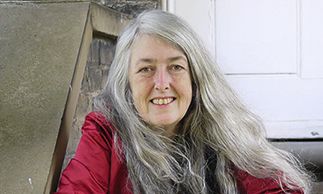It takes effort to see past Clarke's "posh exterior", Beard says
© Robin Cormack
The BBC has sparked debate about the merits of the epochal 1969 documentary Civilisation—conceived by Kenneth Clark—by posting a new segment by Mary Beard on its iPlayer catch-up service in which the high-profile historian questions the exclusively “European story” told by Clark.
The BBC also posted a note on the website, where all 13 episodes can be viewed, saying: “Programmes are selected, in part, for their historical context and reflect the broadcast standards and attitudes of their time, which may not accord to some current BBC editorial guidelines. We aim to select programmes which can be shown in their entirety but in some cases edits are required [Civilisation has not been edited].”
The move opened up another front in the culture wars, enflaming some critics including the author Douglas Murray who writes in The Telegraph: “The series has been re-released by the BBC with a warning note alerting fragile viewers to the fact that it reflects ‘standards and attitudes’ of its time, which is one of the most banal statements it is possible to make. Who does not reflect their time? But really what this is of course is a trigger warning. A warning that this series was made in a less enlightened time than ours.”
At the start of his series, Clark asked: “What is civilisation? I don’t know. I can’t define it in abstract terms, yet. But I think I can recognise it when I see it.” Turning to Notre Dame in Paris, he added: “And I’m looking at it now.” In other episodes, he focused on the “upheavals of the Reformation” and “the Holland of Rembrandt and the London of Purcell and Wren”.
In the segment added online Beard says that Civilisation was "hugely influential” on her and is one of the reasons why she became an academic. She adds: “I’d never really grasped before that you could tell a story about culture.”
She adds: “He’s telling a story which remains entirely, really, a European story… you look at it now and he doesn’t even go to Spain,” she adds, though she acknowledges Clark hoped to include the country. “At one point he says, looking at the famous Roman statue of the Apollo Belvedere, he says, ‘Once upon a time, this was the most famous statue in the world’. And you think, it wasn’t famous in India mate!”
His real skill was to make the history of culture seem exciting, she says. “There was a narrative there and a story you wanted to follow.” But “it does take a bit of an effort sometimes to see through the kind of apparently posh exterior,” says Beard. “I also hope that some people who are… very definitely in the cult of Clark watch it, perhaps watch it again, and think about… what are you missing?”
In 2018, the BBC broadcast a sequel to Civilisation, entitled Civilisations, fronted by a number of experts including Beard and the historians Simon Schama and David Olusoga.
Reviews of the programme described the sequels as innovative but occasionally muddled. In The Guardian, the art critic Jonathan Jones described the series as a "truly global history of art" which "has sacrificed story to space". Sebastian Smee, The Washington Post's art critic, called it "the most ambitious story about art ever told on television" noting, however, that "[s]ometimes the narrative is glib".
Beard herself says in the new iPlayer segment: “I think in some ways that when we remade Civilisation to include the rest of the world, and put an S on the end, what we lost was the story because there isn’t a narrative of world art.” Civilisation has not been broadcast since 2011; viewing figures were initially low but reached around 2.5 million by the end of the series in 1969. Beard points out that interest in Civilisation grew after it was screened non-stop at the National Gallery of Art in Washington DC late 1969.

